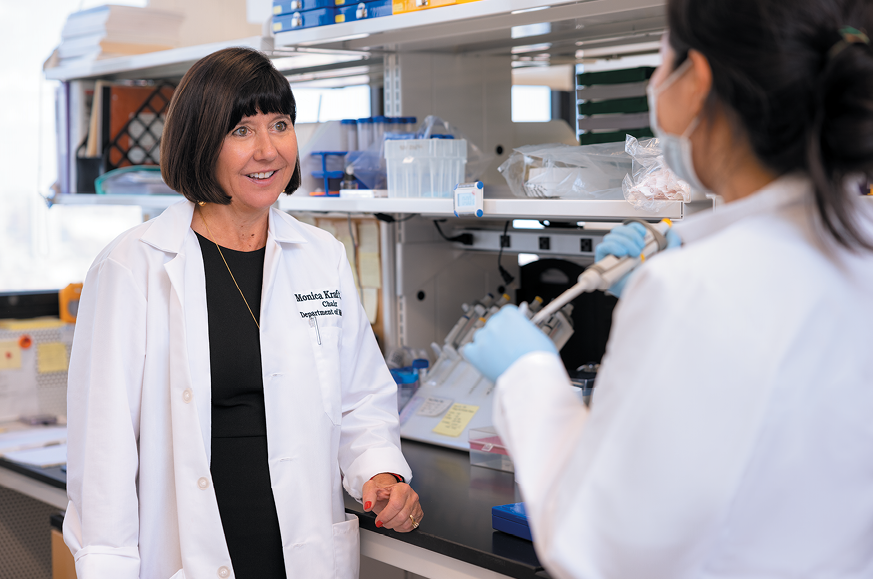- Home
- Media Kit
- MediaJet
- Current Issue
- Past Issues
- Reprints (PDF)
- Photo Specifications (PDF)
- Contact Us
- PRIVACY POLICY
- TERMS OF USE
![]()
ONLINE
![]()
ONLINE

A Shared Mission
And Vision
Editors’ Note
Dr. Monica Kraft is the Murray M. Rosenberg Professor of Medicine and System Chair for the Department of Medicine at Mount Sinai Health System and the Icahn School of Medicine at Mount Sinai. She was previously on the faculty of the University of Arizona, where she was the Robert and Irene Flinn Endowed Professor and Chair of the Department of Medicine and Deputy Director of the Asthma and Airways Disease Research Center. Previously, she was Chief of the Division of Pulmonary, Allergy, and Critical Care Medicine; the Charles Johnson Distinguished Professor; and Director of the Asthma, Allergy and Airway Center at Duke University. Kraft has published extensively in the areas of adult asthma and chronic obstructive pulmonary disease and has been funded by the NIH continuously for more than 25 years. Her work in precision medicine has resulted in her leadership for the NIH All of Us grant at the University of Arizona and recognition as the Arizona Bioreseacher of the Year. Dr. Kraft is the author or co-author of more than 240 peer-reviewed articles, editorials, reviews, and book chapters. She is an Associate Editor of the American Journal of Medicine, and a former Associate Editor of the European Respiratory Journal and the American Journal of Respiratory Cell and Molecular Biology. She has received numerous prestigious awards and honors, including the Presidential Early Career Award for Scientists and Engineers, the American Thoracic Society Distinguished Career Award, the Elizabeth A. Rich Mentorship Award, and the American College of Chest Physicians Distinguished Educator Award. She is a leader in medical research and professional medical organizations, serving as President of the American Thoracic Society, council member of the Association of Professors of Medicine, and a member of the Advisory Council of the National Heart, Lung and Blood Institute. Dr. Kraft received her MD from the University of California, San Francisco. She completed her residency at Harbor-UCLA Medical Center, where she was also Chief Resident. She completed her fellowship in Pulmonary and Critical Care Medicine at the University of Colorado and joined the faculty as the Director of the Carl and Hazel Felt Laboratory for Adult Asthma Research and as Medical Director of the Pulmonary Physiology Unit at National Jewish Health.

Dr. Monica Kraft at work in a lab at Mount Sinai
What has made Mount Sinai Health System an industry leader and how do you describe the Mount Sinai difference?
It is a pleasure to serve as System Chair of Medicine at Mount Sinai. I have found the environment collegial and collaborative as faculty, trainees, and staff all want excellence and work together to achieve it. The care we provide to our patients is outstanding, and after having worked at a few institutions, I feel I can make that honest assessment. Mount Sinai also embraces innovation in ways that are unmatched to other institutions. Lastly, the Mount Sinai Health System and the Icahn School of Medicine at Mount Sinai are closely aligned, an integration that is critical as clinical medicine becomes more complex. The Health System understands and embraces the academic missions of research and education, not commonly seen these days at academic medical centers where tension between the health system, which often exclusively runs the clinical enterprise, and the school of medicine, which directs the research and education enterprises, can be significant.
“The focus of the Mount Sinai Health System is to provide world-class clinical care with efficient and easy access in a safe, sustainable environment that is respectful to all members of the community.”
Will you provide an overview of your role and areas of focus?
While the Department of Medicine at the University of Arizona was considered small to medium size with approximately 300 faculty across two hospitals, the Department of Medicine at Mount Sinai has over 1,700 faculty spanning eight hospitals. I oversee the departments of medicine at these hospitals, each of which has its own leadership teams. Each institution in the system serves a different role within a shared mission and vision in endeavors ranging from community care to world class advanced specialized care to groundbreaking basic science and clinical research. The focus of the Mount Sinai Health System is to provide world-class clinical care with efficient and easy access in a safe, sustainable environment that is respectful to all members of the community.

The Mount Sinai Hospital and Icahn School of Medicine
at Mount Sinai in New York City
You are internationally renowned for your work addressing asthma. Will you discuss the advances in research and treatment for patients with asthma?
My research in asthma has a few areas of focus. I employ precision-based approaches that include use of biomarkers, genetics and artificial intelligence and machine learning for the treatment of severe asthma and COPD through innovative clinical trials. Additionally, I have a laboratory where my team investigates mechanisms of host defense (innate immunity) to better understand why patients with asthma and COPD are subject to severe attacks or exacerbations that can lead to hospitalizations and death.
I am also committed to translating my research to global impact. Our research team discovered novel immune properties of the surfactant protein, one that is made by the lung to protect it from infections. Through this work, I founded a company, RaeSedo, Inc., where we are developing a first-in-class, innate immune modulator for the treatment of asthma, chronic obstructive pulmonary disease (COPD) and other lung diseases. RaeSedo has received multiple rounds of NIH small business grants and substantial angel investment.
Do you feel there are strong opportunities for women in leadership roles in medicine?
While I feel there are opportunities for women in leadership roles in medicine, I will say there is opportunity to do this more intentionally and thoughtfully. Mount Sinai has done a great job promoting women as leaders across the Health System and the Icahn School of Medicine at Mount Sinai. However, this is not necessarily true across institutions in many parts of the country. I would like to see more women in higher roles serving as Deans and health system CEOs. I worry that, although over 50 percent of medical school students are now women, the percentage of women who attain full professor positions drops sharply to just 10-20 percent. Helpful areas to address include providing on-site childcare, and offering truly part-time positions with pathways that lead to full-time roles with opportunities for promotion and tenure. Addressing these and other issues could make staying in academic medicine more attractive for women.
What advice do you offer to young people interested in pursuing a career in medicine?
I can say that after being in the field for over 30 years, medicine – particularly academic medicine – is an incredibly satisfying career. It is not an easy career, and one cannot do this if motivated mainly by compensation and lifestyle. It is a calling, and I highly recommend it.![]()